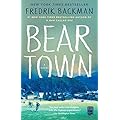
“David. But do you want to hear my best advice about being a parent?” “Yes.” “ ‘I was wrong.’ Good words to know.”
“You may not be an angel, Benjamin, I know that much. But, dear God, you haven’t lacked a role model. All your best qualities come from the fact that you’ve been raised in a house full of women.”
Fredrick Backman can tell a story that seems so familiar. Although this book is seemingly about hockey, it is really about life and how humans relate to each other. It takes place in Beartown, a small isolated town in Sweden where life revolves around hockey. There is a junior league that hopes to have a national championship. Although the team members are tight-knit, it is evident that there are several real-life struggles among the high school students and the coaches. Kevin, the team star, lives in an affluent area of town in a large house envied by others. His parents, however, do not attend hockey games but instead offer considerable financial support to the team.
Benjamin (Benji) lives on the other side of town, and although he is a good hockey player, he does not have the monetary resources and is dependent on others to outfit him with the required hockey equipment. Benji and Kevin are good friends, yet it becomes evident that Benji has a strong moral compass and Kevin may not.
Peter, GM of the hockey club in Beartown, is married to Kira, an attorney, and they have had three children, one of whom died. Their daughter Maya is fifteen years old and has a good friend, Ana, another character who does not live with privileged advantages. Both fifteen-year-old girls become major characters alongside the hockey players as the story develops.
When Kevin does the unthinkable to Peter’s daughter Maya, the townspeople show their true colors, and the values of the citizens of Beartown become apparent. Backman uses various characters to build essential themes related to sexual assault, sexual identity, and sexist and homophobic jokes in locker rooms. How politics, money, and control are interwoven in everyday life are explored through the incidents in this carefully constructed novel. Besides examining the exploitation of the hockey players as commodities and the bullying that is commonplace in school and on the team, Backman does a great job showing how secretive members of a small community can be. There are many profound comments about relationships, parenting, and growing up. When it comes down to it, hockey provides the framework for the story, but the novel is not about hockey; it is about how human beings relate to each other and how good and evil play out in modern towns.


